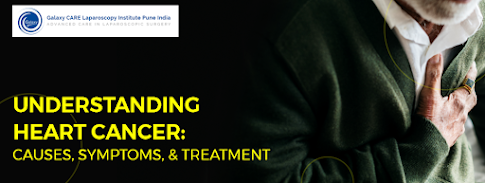UNDERSTANDING HEART CANCER: CAUSES, SYMPTOMS, & TREATMENT
requires attention and understanding. In this blog, we will delve into the causes, symptoms, and available treatments for heart cancer, shedding light on this often misunderstood aspect of cardiovascular health.
Causes of Heart Cancer:
Heart cancer, also known as cardiac tumors, can be broadly categorized into primary and secondary tumors. Primary tumors originate within the heart, while secondary tumors spread to the heart from other parts of the body. The exact causes of primary heart tumors are not well-defined, but some factors may contribute to their development:
- Genetic Factors: Certain genetic conditions, such as Li-Fraumeni syndrome, may increase the risk of developing heart tumors.
- Radiation Therapy: Individuals who have undergone chest radiation therapy for other medical conditions may have a higher risk of developing heart tumors.
- Metastasis: Cancers from other organs, such as the lungs or breasts, can metastasize and affect the heart.
Symptoms of Heart Cancer:
Identifying heart cancer can be challenging due to its rarity and the overlap of symptoms with other cardiovascular conditions. However, some common symptoms may indicate the presence of cardiac tumors:
- Irregular Heartbeat: Palpitations or irregular heartbeats can be a sign of heart tumors affecting the heart's natural rhythm.
- Chest Pain: Persistent chest pain, not relieved by typical treatments, should be investigated further.
- Shortness of Breath: Difficulty in breathing, especially during physical activity, may signal a problem with the heart.
- Fatigue: Unexplained fatigue and weakness may be indicative of underlying cardiac issues.
Diagnosis and Treatment:
- Diagnostic Imaging: Imaging techniques like echocardiography, MRI, and CT scans help visualize the heart and detect any abnormal growths.
- Biopsy: A biopsy may be performed to determine whether a tumor is cancerous or benign.
- Surgery: In some cases, surgical removal of the tumor may be the primary treatment, especially if the tumor is causing significant symptoms or poses a risk of interfering with the heart's function.
- Chemotherapy and Radiation: These treatments may be recommended in cases of malignant tumors or when surgery alone is not sufficient.
- Targeted Therapy: This involves using drugs that specifically target cancer cells, minimizing damage to healthy tissues.
Conclusion:
While heart cancer is a rare condition, understanding its causes, recognizing its symptoms, and exploring available treatments is crucial for timely intervention. If you or someone you know is experiencing unusual cardiac symptoms, seeking prompt medical attention and diagnosis is vital for effective management. Ongoing research and medical advancements continue to improve our understanding and treatment options for this uncommon but serious condition.



Comments
Post a Comment